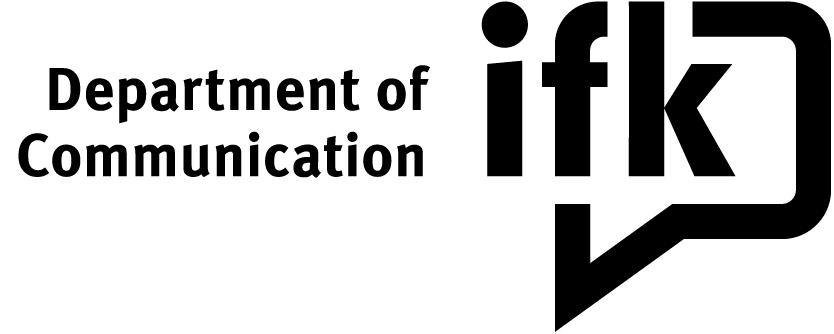

Master Communication Science
Overview
- Degree: Master of Arts
- German-language teaching programme
- Workload: 120 ECTS
- Standard period of study: 4 semesters, full-time programme
- Winter semester admissions only18 students per year
- No tuition fee (only semester fee)
- Application period starting in May 2025 (Deadline: 15.07.2025)
What significance do media such as generative AI, social networks, online platforms, newspapers, and radio have for our society and for us as users? Who owns these media and who creates their content? In what ways are different topics represented in the media? And how do we perceive this content?
In the research-oriented MA in Communication Science (KoWi), students develop a comprehensive understanding of the diversity of media and communicative processes in a wide range of social fields such as politics, business, and science.
Media realities shape the way we recognise and experience things. They sometimes influence the way we think, feel or even act. At the same time, these media realities and media systems are constantly changing: Professional journalism, a central element of democratic public spheres yet highly at risk, no longer takes place solely in so-called traditional print media and broadcasting. Instead, it now appears in a wide variety of new online formats and on various online platforms, particularly social media. These online communication media play a key role in driving societal changes. They offer new opportunities for creating and mobilising public spheres, e.g. in political communication and online activism, while also contributing to a further transformation in social relationships.
Digitalisation and datafication also have negative social, environmental, and economic consequences, which we examine in the Master's programme. Examples include disinformation, hate speech, CO₂ emissions from online communication, and electronic waste production. We analyse ways to address these challenges and to act more sustainably with digital media and generative AI.
These and other topics are the focus of the KoWi Master's programme. Over the course of typically four semesters, students address current communication science issues, carry out a two-semester research project, and deepen their knowledge of qualitative and quantitative research methods. Upon completion of the programme, graduates are able to independently tackle complex problems and reflect on the implications of scientific findings for various fields of professional practice. They have learned to ask the right questions, analyse precisely, and appropriately contextualise and present their results. These are core competencies that qualify them for a wide range of communication science careers beyond academia.
Frequently asked questions
Who is the Master's programme "Communication Science" suitable for?
Graduates of a bachelor's degree in communication science (or related fields) have the opportunity in this Master's programme to further develop their theoretical and methodological knowledge and test it in (research) practical projects. This Master's programme is ideal for those with a special interest in communication science research who wish to understand the field in all its breadth and depth.
What is so special about this Master's programme?
This Master's degree programme is characterised by its broad range of topics. Seminars deal with different phenomena of the digital and datafied society, which are researched by the various departments at the institute. At the Department of Communication (IfK), you study at the forefront of research in small groups and benefit from close supervision by the lecturers.
What will I learn during my studies?
In the Master's degree programme “Communication Science”, students develop a comprehensive understanding of the diversity of media and communicative processes. They learn how communication occurs, how it is created, and how it impacts audiences. To do this, lecturers discuss and reflect with them on various theoretical concepts and approaches in seminars, applying them to a wide range of subjects and topics. The programme is also research-oriented, with a clear focus on empirical methods of qualitative and quantitative social research and their application in independent research projects.
Is there a special admission procedure?
Yes, for the Master's programme in Communication Science, there is an admission process for each winter semester for approximately 18 students per programme, just like all Master's programmes at the Department of Communication (IfK). The programme is aimed at graduates of relevant Bachelor's programmes, such as Communication, Journalism, or Media Studies. The selection committee at the Department of Communication checks the formal admission requirements—without additional interviews, assessment centres, etc. The formal requirements are defined in the admission regulations, which can be found under "Forms and Downloads"; further information on admission requirements and the admission procedure can be found on this page.
What career prospects do I have after this degree programme?
The Master KoWi programme trains students to become communication and media experts who, given their broad specialist and methodological knowledge, can pursue careers in a wide range of professional fields. These range are from journalism and political communication to university-level or applied media research. Take a look at the page "Life and Career" to gain insights into the career paths of some KoWi graduates.
Does the Master's programme “Communication Science” include a semester abroad?
The department has an international profile, as it offers a comprehensive programme for European academic exchange through 17 different Erasmus agreements. This gives students the opportunity to spend their final semester abroad on a voluntary basis. Please click here for further information on our international profile.
Do you still have any questions? Then take a look at our FAQ or contact Dr Stephan Völlmicke (Student Advisory Service).

